If you are experiencing an intermittent coolant leak, there are a few steps you can take to diagnose and address the issue.
Firstly, you should check the coolant reservoir and all of the hoses leading to and from the radiator, as well as any other components of the cooling system.
Look for any signs of coolant present, as well as any signs of damage or wear that could be causing the leak.
Once you have identified the source of the leak, you can go about fixing it. Depending on the severity of the leak, this could involve replacing a hose, tightening a clamp, or replacing a component entirely.
Intermittent coolant leaks are sporadic or occasional leaks in a vehicle’s coolant system. They can occur at different locations, such as hoses, radiator, water pump, or gaskets, and can lead to a loss of coolant over time, causing coolant loss and potential engine damage. Promptly address these leaks by consulting a mechanic to identify and fix the issue.
Table of contents
Why is my coolant leaking occasionally?
If you’ve noticed a coolant leak in your car, it can be concerning. Coolant is essential to keeping your engine running at the right temperature and preventing damage caused by overheating or freezing.
An intermittent coolant leak can be particularly frustrating because it’s not always present and may only show up after the engine has been running for some time.
The first step in understanding an intermittent coolant leak is to identify its location.
Check under the car for visible fluid on the floor or sudden fluctuations of temperature on your gauge. If you have received any warning posts or messages related to low coolant level, check that too.
Knowing where the leak is coming from will help you diagnose and fix the problem. Common areas for leaks include hose joints, radiator bottoms, water pumps, and around the base of coolant reservoirs.
Once you know where the leak is coming from, diagnosing an intermittent coolant leak involves inspecting various parts of your cooling system including radiator caps, hoses and clamps etc., making sure everything looks good as per their position.
Pressure testing methods might also come handy in locating a hidden leakage source which leaves no traces behind initially.
Taking professional opinion can save further potential future costs if there are any severe damages detected or about to happen due to leakage problems.
Signs of Intermittent Coolant Leaks:
- Fluctuating temperature gauge
- Low coolant level warning
- Visible fluid on the floor under the car
- Overheating or freezing engine
- Reduced engine performance
- Sweet smell coming from the engine compartment
- Hissing or bubbling sounds coming from the engine compartment
What Causes Coolant Leaks?
There are several reasons why coolant leaks can occur in a vehicle.
| Cause | Symptoms |
|---|---|
| Radiator hose | Hoses can become brittle and crack over time, or they can be damaged by road debris. |
| Radiator cap | The radiator cap helps to keep the coolant under pressure, which helps to prevent leaks. If the cap is damaged or not working properly, it can cause coolant to leak. |
| Water pump | The water pump circulates coolant throughout the engine. If the water pump fails, it can cause coolant to leak. |
| Head gasket | The head gasket seals the combustion chamber from the cooling system. If the head gasket fails, it can cause coolant to leak into the combustion chamber. |
| Corrosion | Corrosion can cause cracks in the radiator, hoses, and other parts of the cooling system. |
| Improper maintenance | If the coolant is not changed regularly, it can become contaminated and cause leaks. |
1. Failed Gasket:
When a gasket fails, it can create a variety of issues in your vehicle. One of the most common problems that occurs when a gasket fails is an intermittent coolant leak.
This type of leak can be difficult to diagnose because it may only occur under certain conditions or at certain times.
One possible cause of an intermittent coolant leak is a blown head gasket. The head gasket sits between the engine block and cylinder head and helps to seal the combustion chambers and cooling system from each other.
When this gasket fails, it can allow coolant to leak out into the combustion chamber, causing white smoke from the exhaust or overheating.
Another potential cause of an intermittent coolant leak is a failed intake manifold gasket. The intake manifold sits on top of the engine block and helps to distribute air and fuel to the cylinders.
When this gasket fails, it can allow coolant to enter into the combustion chamber or oil passages, leading to overheating or engine damage over time.
Overall, if you suspect that your vehicle has an intermittent coolant leak due to a failed gasket, it’s important to have it diagnosed and repaired by a professional mechanic as soon as possible in order to prevent further damage and costly repairs down the line.
2. Damaged Hose:
One common cause of an intermittent coolant leak is a damaged hose. Over time, hoses can become worn out and brittle, causing small cracks or holes to form.
These small openings may not be immediately noticeable but can lead to a slow leak of coolant over time.
Additionally, extreme temperatures and pressure changes within the engine can also contribute to hose damage.
When the engine is hot, hoses expand and then contract when it cools down. This constant expansion and contraction put stress on the hoses that can eventually cause them to crack or tear.
To prevent this issue from occurring, it’s important to regularly inspect all hoses for signs of wear and tear.
Look for any visible cracks or bulges in the rubber, as well as any signs of leaking around fittings or connections.
If you notice any issues with your hoses, it’s important to get them replaced as soon as possible before they worsen and lead to more significant leaks or engine problems.
3. Corrosion within the radiator:

One of the main causes of an intermittent coolant leak is corrosion within the radiator. Corrosion is a natural process that occurs when metal gradually breaks down due to exposure to air, water, and other environmental elements.
In a radiator, corrosion can weaken the metal over time and create small cracks or holes that allow coolant to escape.
Corrosion often starts at the bottom of the radiator where sediment and debris can accumulate and trap moisture against the metal surface.
This creates a perfect environment for rust to develop, which slowly eats away at the metal until it becomes too weak to hold pressure.
To prevent corrosion from causing an intermittent coolant leak in your vehicle’s radiator, it’s important to maintain good cooling system hygiene by flushing out old coolant and replacing it with fresh fluid every few years.
Regularly inspecting your radiator for signs of damage or wear can also help catch any issues early on before they turn into major leaks.
Additionally, using quality antifreeze/coolant products that contain additives designed specifically for preventing rust and corrosion can help extend the life of your vehicle’s cooling system components.
4. Faulty Radiator Cap:
A faulty radiator cap is one of the common causes of intermittent coolant leaks. The radiator cap’s primary function is to maintain the pressure in the cooling system and prevent the escape of coolant.
If the radiator cap is not functioning correctly, it can cause a drop in pressure, which leads to coolant leaks.
The most common problem with a radiator cap is that its sealing surface becomes worn out or damaged over time. When this happens, it allows air to enter into the cooling system, leading to low pressure and ultimately causing coolant leaks.
Another issue that may arise with a faulty radiator cap is that it may not be able to hold enough pressure in the cooling system, leading to overheating and eventual engine damage.
If you suspect that your vehicle has a faulty radiator cap, you should take immediate action by replacing it as soon as possible. This will help prevent any further damage from occurring due to a lack of proper engine cooling.
To ensure that you get the right type of radiator cap for your vehicle, consult with an expert mechanic or refer to your car’s owner manual for guidance on selecting an appropriate replacement part.
5. Water Pump Issues:
Water pump issues can be a common cause of intermittent coolant leaks in vehicles. The water pump is responsible for circulating coolant throughout the engine, and if it begins to malfunction, it can lead to a variety of problems.
One common issue with water pumps is that they may develop small leaks or cracks over time, which can lead to a loss of coolant.
Another possible problem with water pumps is that they may become clogged or blocked by debris or other contaminants.
This can result in reduced flow rates and increased pressure within the system, which can ultimately cause leaks and other damage.
Additionally, some water pumps may simply fail due to wear and tear over time, particularly if they are not properly maintained or serviced on a regular basis.
To avoid these types of issues with your vehicle’s water pump, it’s important to have it inspected regularly by a qualified mechanic. This will help identify any potential problems early on before they become more serious and costly to repair.
Additionally, keeping up with routine maintenance tasks like changing the coolant regularly and replacing worn-out parts as needed can also help keep your vehicle running smoothly for years to come.
6. Faulty Water Control Valve:
One of the primary causes of intermittent coolant leaks is a faulty water control valve. This valve regulates the flow of hot engine coolant through the heater core to provide warm air for the cabin.
If it fails, it can cause issues with both heating and cooling systems, leading to intermittent leaks.
The water control valve can become stuck in an open or closed position due to corrosion or debris buildup, resulting in either a lack of heat or continuous overheating. Additionally, if there is an internal leak within the valve itself, it could be contributing to intermittent loss of coolant.
It is important to have a mechanic inspect and replace any faulty water control valves as soon as possible to prevent further damage to other components in your vehicle’s cooling system.
Regular maintenance checks and flushing out debris from your system can also help prevent this issue from occurring in the first place.
Consequences and Prevention Measures:

Consequences of an intermittent coolant leak can be severe and costly. If left unaddressed, a coolant leak can result in engine overheating, which can cause irreparable damage to the engine block and other important components.
Additionally, a coolant leak may lead to decreased fuel efficiency, as the engine will have to work harder to compensate for the loss of coolant. In extreme cases, a coolant leak could even lead to complete engine failure.
To prevent these consequences from occurring, it is crucial to take measures to address and prevent an intermittent coolant leak.
Regularly checking the level and quality of your vehicle’s coolant can help you identify any potential leaks early on.
In addition, inspecting hoses and connections for signs of wear or damage is important in ensuring that they are functioning properly.
Finally, following manufacturer recommendations for maintenance schedules will help prevent leaks before they occur by ensuring that all components are working as they should be.
By taking these preventative measures, you can save yourself time and money in avoiding more significant repair costs down the line.
Diagnosing Intermittent Coolant Leaks:
If you suspect an intermittent coolant leak, diagnosing the issue promptly is critical to prevent engine damage. To diagnose a coolant leak, there are some key areas of your car’s cooling system that you should check.

1. Inspect the Radiator Cap
To diagnose intermittent coolant leaks, start with a visual inspection of the radiator cap.
- Make sure it’s seated properly and securely on the top of the radiator. If it appears to be corroded or damaged in any way, replace it immediately.
- Next, check the pressure in the cooling system using a pressure tester tool. This will help you locate any potential leaks within the system and pinpoint their location accurately.
- If you detect low pressure in your cooling system, there may be a problem with your radiator cap or hose connection that is causing your coolant to leak out. Be sure to examine all hose connections carefully for signs of cracking or damage.
- Keep an eye on your engine temperature gauge while running to see if it fluctuates abnormally high or low during use.
- The level of coolant inside your expansion tank should also be monitored regularly as part of routine maintenance procedures.
Checking these components often can help prevent larger costly problems down the line like damage to other parts such as heater regarding cooling issues which can cause bigger problems than just overheating alone.
2. Look for Visible Signs of Leakage:
When diagnosing an intermittent coolant leak, it’s important to look for visible signs of leakage.
Check the ground under your car for any fluid stains or puddles, as well as the engine bay for any wet spots or discoloration around hose joints, the radiator, water pump, or the coolant reservoir.
You may also notice a sweet, fruity smell coming from your engine bay, which is a sign of coolant leaking. By identifying these signs early on, you can prevent further engine damage and avoid costly repairs.
3. Pressure Test the Cooling System:
Another way to diagnose an intermittent coolant leak is to pressure test the cooling system.
This involves using a pressure tester tool to apply pressure to the system and see if there are any leaks. It’s best to do this when the engine is cold and not running.
If there is a leak, the pressure will drop, and you may be able to pinpoint the location of the leak.
It’s important to note that pressure testing should be done carefully and according to manufacturer guidelines to avoid causing damage to the system.
4. Inspect the Hoses and Clamps:
Inspecting the hoses and clamps is another important step in diagnosing intermittent coolant leaks. Look for any signs of cracks, wear, or damage on the hoses, as well as any looseness or damage to the clamps.
Tighten any loose clamps and replace any damaged hoses or clamps as needed. It’s also important to ensure that the hoses are properly connected to the radiator, water pump, and other components of the cooling system.
By inspecting and maintaining these components, you can prevent coolant leaks and ensure that your engine stays cool and running smoothly.
Fixing Intermittent Coolant Leaks:
Replace Faulty Gaskets or Seals:
One common cause of intermittent coolant leaks is faulty gaskets or seals. These can become worn or damaged over time and allow coolant to escape. To fix this issue, the faulty gasket or seal will need to be replaced.
Replace Damaged Hoses or Clamps:
If the coolant leak is due to a damaged hose or clamp, these will need to be replaced. Make sure to use high-quality replacement parts to ensure a proper seal and prevent future leaks.
Replace the Radiator or Water Pump:
If the leak is coming from the radiator or water pump, these components may need to be replaced. This is a more involved repair and may require the assistance of a professional mechanic.
Tighten Loose Connections or Clamps
If you have identified that a loose connection or clamp is the root cause of your intermittent coolant leak, it’s important to address it as soon as possible.
Tightening loose connections or clamps can often be an easy fix that can prevent more serious problems down the road.
To tighten loose connections or clamps, start by locating the exact location of where the coolant is leaking from. Once you’ve identified the area, check for any visible signs of looseness in the connection or clamp.
Using a wrench, pliers, or other suitable tools carefully tighten any loose connections without over-tightening and causing damage to surrounding components like hoses and pipes.
It’s important to remember that proper tightening requires balance between not being too tight but also avoiding being too loose because such under-tightened hose connections will eventually lead to engine oil contamination and overheating problems due to coolant leaks.
Once you’ve tightened all potentially dangerous areas with faulty connections, clean up excess fluid around your engine bay before starting your vehicle again.
Remembering this simple step may save thousands on repairs caused by severe damage while ensuring longevity for your engine at optimal cooling levels during both idle time and running moments.
Conclusion and final thoughts 💭
An intermittent coolant leak is a serious problem that should not be ignored. It can cause significant engine damage and lead to overheating or freezing in colder months.
If you notice any signs of leaking coolant such as visible fluid on the floor or sudden fluctuations in your temperature gauge, it’s important to take action.
Firstly, locate the source of the leak – check hose joints, radiator location, water pump and base of the coolant reservoir. If unsure where to start troubleshooting or how best to fix it then seek professional advice.
Regular inspections of your cooling system are important for preventative maintenance purposes.
Ensure you maintain proper levels and regularly check the condition of hoses and clamps.
Furthermore, ensure regular maintenance like changing out old coolant in the radiator every two years which can prevent leaks from occurring.
It’s essential to note that coolant is toxic and harmful both for people and pets making repair a priority if there are any suspected issues with your vehicle’s cooling system.
Overall monitor your car closely by checking levels before running other errands while making sure pressure tests for proper operation when required so problems don’t arise later on down the road!
Latest Posts:
- Can WD-40 Remove Scratches on Cars? (Hint: Yes, but…)
- Can You Use a Drill to Polish Your Car? (We Tried it Out!)
- Should You Cover Car Scratches With Stickers? (REVEALED!)
- Buick Service Stabilitrak: (Causes & 100% Guaranteed Fix!)
- Common Holden Trax Problems (Causes & 100% Proven Fixes!)
- Jeep Commander Transmission Over Temp: (Guaranteed Fix!)

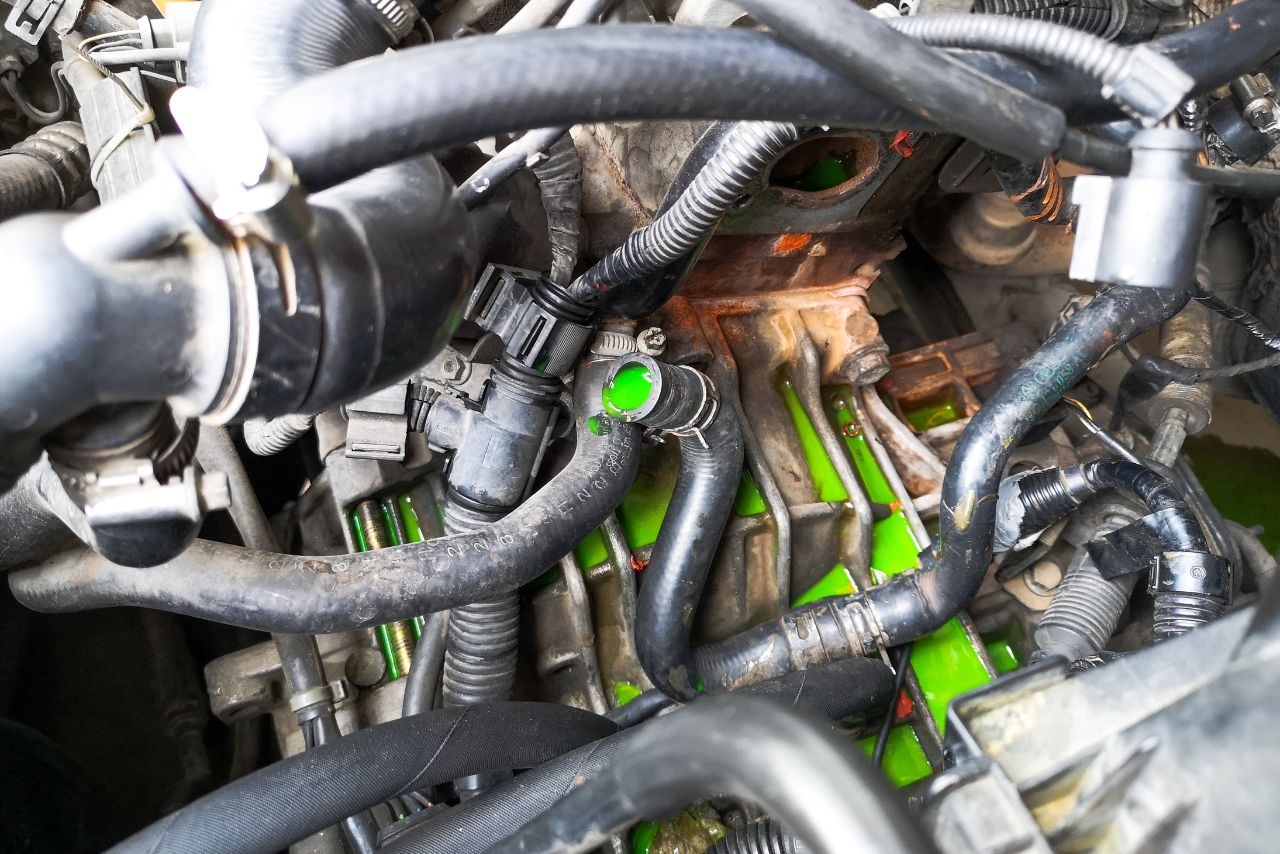
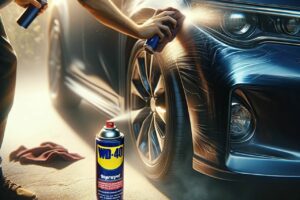


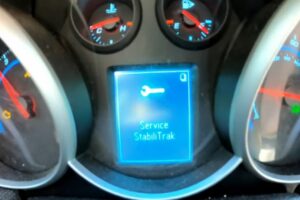

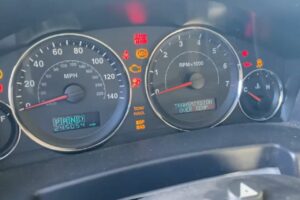
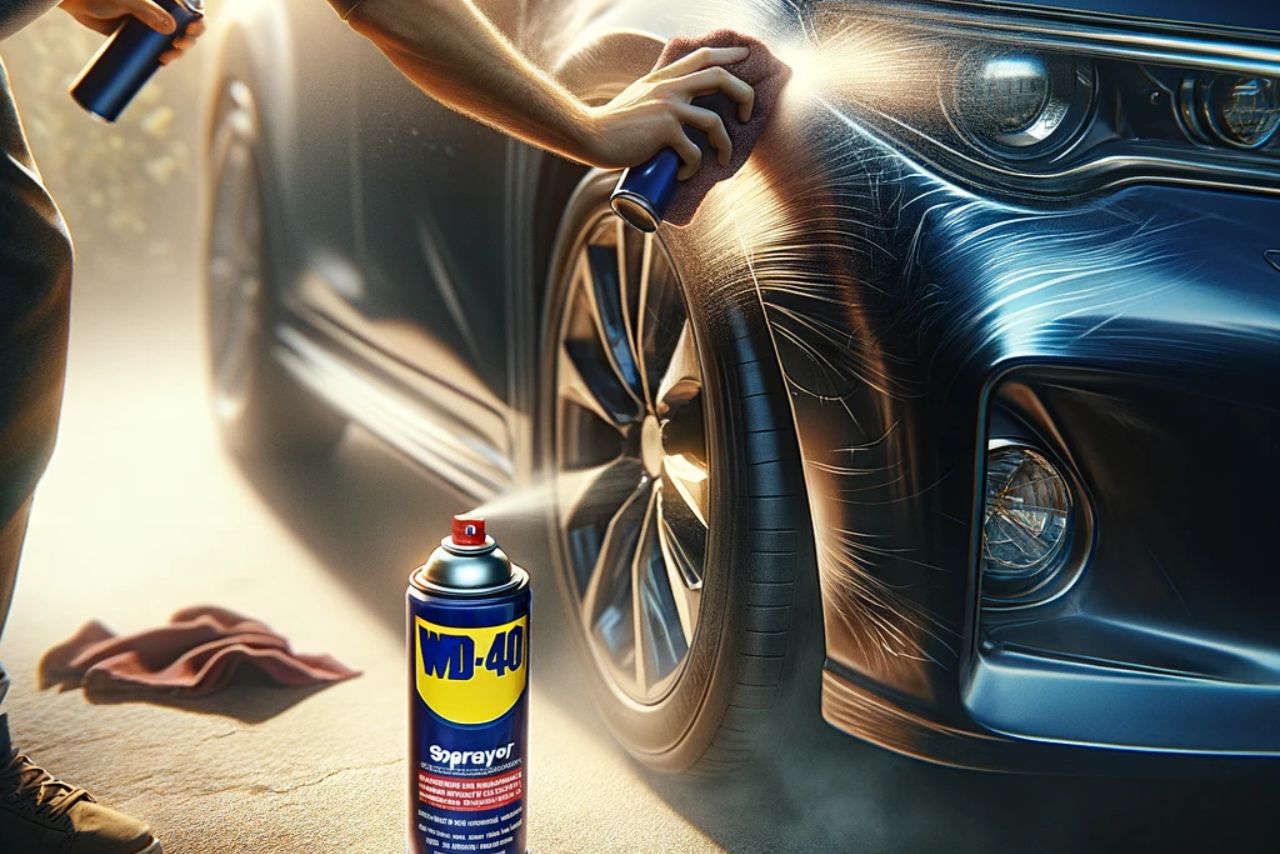
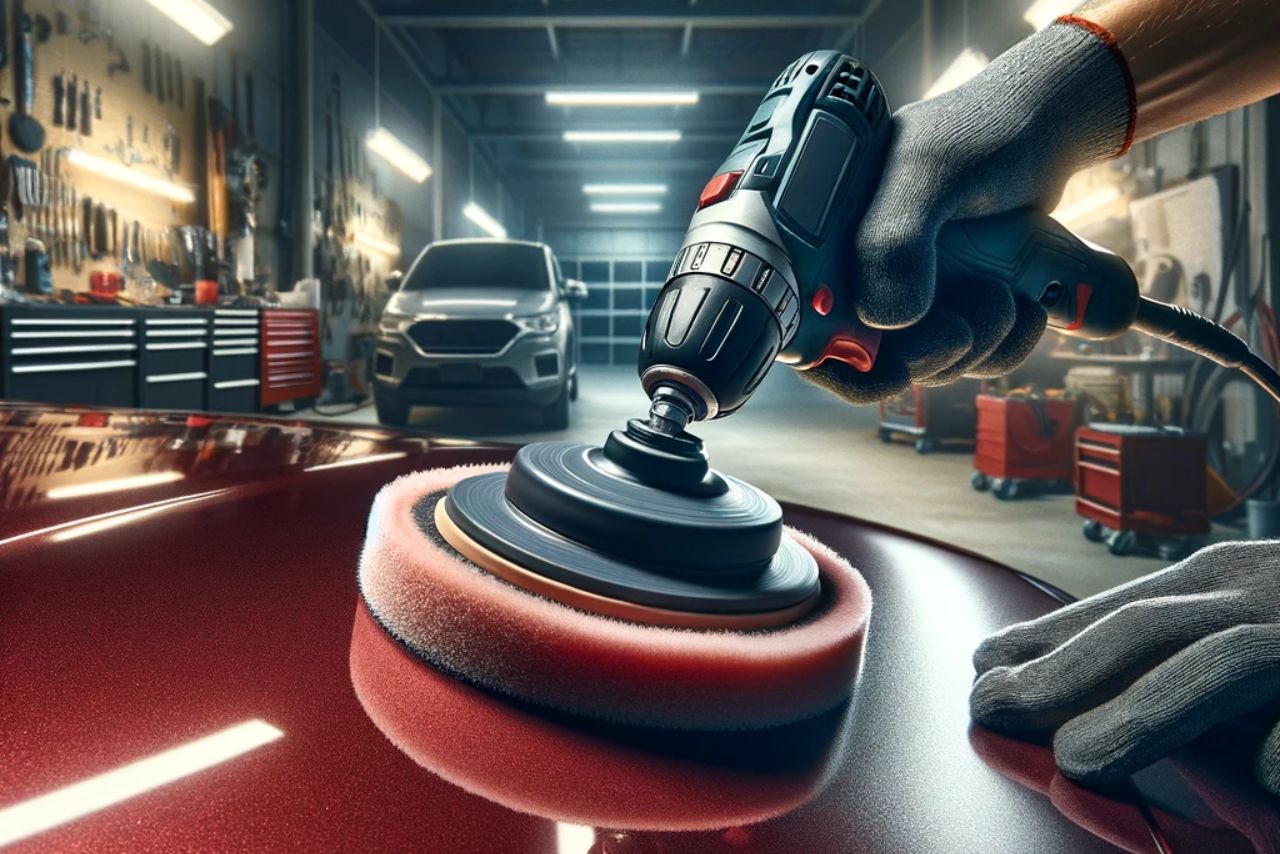

Leave a Reply